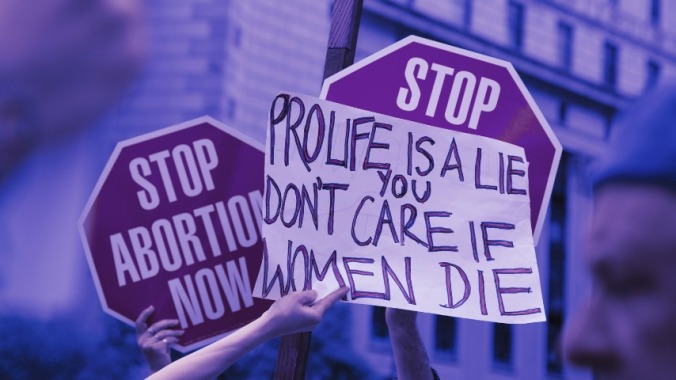Now Alabama Wants to Charge Abortion Patients With Homicide
“Remember, every cruel anti-abortion law on the books today started out as a bill that many people thought was too extreme to pass," a lawyer for the Center for Reproductive Rights said.
Photo: Getty Images AbortionLatestPolitics
On March 31, Jezebel published a story about the 10 states that have introduced legislation that could charge abortion patients with homicide—a crime that, in some of these states, comes with the threat of the death penalty. Barely two weeks later, and there’s already another state to add to the list. This week, Alabama Republicans filed a new anti-abortion bill, joining the ranks of Georgia, Kentucky, Missouri, South Carolina, Texas, Oklahoma, Indiana, Iowa, Idaho, and North Dakota, who have all filed bills that would charge abortion patients with homicide this session.
In three of these states—Indiana, Oklahoma, and North Dakota—these bills have already failed. But legal experts still warn that whether these bills pass now, or a different iteration of them is introduced and passed later, it’s alarming that this many have been introduced at all. The goal seems to be shifting the Overton window and priming us to one day see prosecuting abortion patients for murder as normal. Bella Pori, state legislative counsel at the Center for Reproductive Rights, called these bills “a terrifying indicator of how the anti-abortion movement wants to escalate their campaign against pregnant people’s rights and lives,” which “should be taken seriously whether or not they pass this year.” She continued, “Remember, every cruel anti-abortion law on the books today started out as a bill that many people thought was too extreme to pass.”
The framing of Alabama’s bill, HB518, by anti-abortion leaders in the state has been especially alarming. Alabama state Rep. Ernie Yarbrough (R) introduced it to repeal a section of the Alabama code that excludes abortion under state homicide law. The state GOP previously introduced the Human Life Protection Act in 2019, which similarly criminalized abortion—but expressly protected abortion patients. There’s no such language in Yarbrough’s bill.
-

-

-

-

-

-

-

-

-

-

-

-

-

-

-

-

-

-

-

-

-

-

-

-

-

-

-

-

-

-

-

-

-

-

-

-

-

-

-

-








































